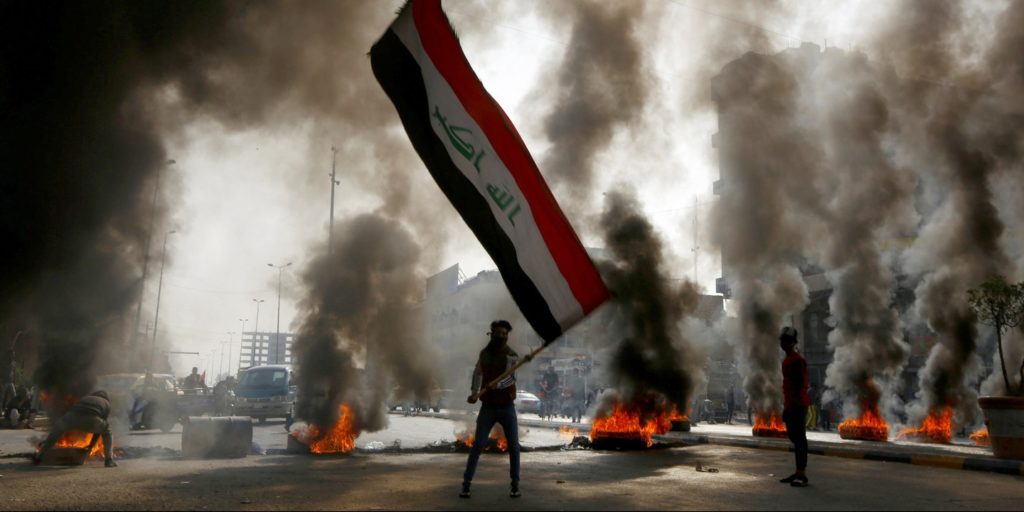Australia/Israel Review
The Persian Autumn
Dec 29, 2019 | David Rosenberg

For a long time it looked like the spread of Iranian influence across the Middle East was unstoppable. Lebanon has long been in Iran’s pocket via Hezbollah. Then the chaos created by the US invasion of Iraq opened an opportunity for Teheran to wield power there too. The Syrian civil war created yet another bridgehead, as did the Hamas takeover of Gaza.
Now, the entire Iran-hegemony enterprise is at risk. Protests have been going on in Iraq and Lebanon for weeks, bringing their economies to a near standstill and forcing their Iran-approved prime ministers to step down. There’s no end in sight to the protests for the very good reason that the Iraqi and Lebanese leaders are powerless to address the protesters’ demands for change without fundamentally altering the system of government that has kept them, and Iran, in power.
The standoff between the protesters and the authorities is a zero-sum game that the governments may yet win, temporarily. But they will have to fight and fight again until they lose.
Other outposts of Iranian hegemony are also at risk. The civil war in Syria has wound down, but the country is still divided between the government, rebels, the Kurds and a Turkish occupation. The economic distress that has kindled the protests in Iraq and Lebanon could just as easily spread to Syria (though more likely, given the government’s zero-tolerance for dissent, public expression of discontent could just lead to renewed fighting).
In Gaza, Israel’s and Egypt’s blockades and Hamas corruption have led to massive poverty and growing anger at those in power.
In all these places, the governments are de facto part of the Iranian empire. From Iraq to Lebanon to Syria and Gaza, the local politicians are loyal to Teheran. In Iraq and Lebanon, the governments are teetering, and in Syria and Gaza, it’s ripe to teeter.
Thus it just could be that unemployed Iraqis and Lebanese struggling to get through the month succeed where Israeli sorties over Syria and US President Donald Trump’s campaign of “maximum pressure” on Teheran have so far failed. They could bring down Iran’s imperial ambitions for the Middle East.
Iran also saw the same kind of mass protests, and its economy is in trouble, but at home Teheran is directly in control and has been able to largely quell the disturbances with a carefully constructed strategy of violence and internet blackouts. For its partner countries, it’s a different story. That is because the empire that Iran has built is an empire of anarchy.
Iran doesn’t have anything near the economic might to create relationships based on trade, investment or technology. It doesn’t even have the conventional military power to influence, much less occupy, neighbouring countries. It does have the soft power of Shi’ism, which it has leveraged in places where there are big Shi’ite populations. But even that strategy has its limits: In Iraq today, it’s Shi’ites who are leading the protests.
Iran’s principal resource in empire-building is chaos. It establishes itself in places where the government is weak (Lebanon and Iraq), desperate (Syria) or friendless and without resources (Gaza). It enroots itself by, among other things, sponsoring local militia groups as proxies, creating a web of money and patronage with local politicians, and by exploiting ethno-sectarian divisions.
It’s an effective system for a weak country, like Iran, that wants to act like a great power. But it’s not a sustainable one.
All of Iran’s Middle East outposts are suffering from severe economic distress. Lebanon’s woes have been so thoroughly reported on there’s no reason to repeat them all here. Iraq’s economy is similarly dysfunctional. Its petroleum industry – the only one of any real value – is thriving, but the profits accrue to a tiny elite of politicians and militia leaders. What’s left percolates down to a massive public sector workforce of bored, underemployed civil servants. Poverty and unemployment are rampant. Syria and Gaza are in such bad shape that their economies are barely functioning at all.
Certainly in the case of Lebanon and Iraq, their troubles are principally of their own making, with a dollop of help from Teheran. Lebanon was once a Middle East entrepot and banking centre. Even today it has a talented and educated population, even if many have left for lack of opportunity. Iraq has the world’s fourth-largest oil reserves and has exported no less than US$1 trillion of the stuff since 2005. Yet Lebanon and Iraq have both failed because the system of weak government that serves Teheran so well has failed the people they are supposed to be serving.
Something was going to have to give, and it seems it finally has. The weak governments cannot engage in serious economic policy and are starting to fall apart. The unemployed and the poor are starting to pour out into the street.
Teheran’s problem is that it doesn’t have the expertise or money to help its ailing allies fix their economies in the way the US, the Gulf states or international institutions might, and the governments of Iran’s clients are too weak and corrupt to do anything on their own.
It’s tempting to see the protests as a new “Arab Spring” – another stab at bringing down the corrupt, self-serving autocracies of the region after the first try ended so miserably. In fact, they are about that on one level, but on a more important level, what’s really happening should be called the “Persian Autumn”: the gradual collapse of Iranian aspirations.
David Rosenberg is economics editor and a columnist at Haaretz. © Haaretz (www.haaretz.com), reprinted by permission, all rights reserved.
Tags: Iran, Middle East






